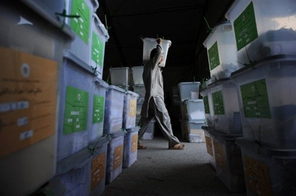Afghan vote decision expected
KABUL: Two months after Afghans voted in controversial presidential elections, authorities were still wrangling Saturday over whether another poll is needed amid negotiations between rival candidates.
Officials in Kabul said Afghan politicians and their international backers have been involved in days of vigorous horse-trading in the hope of averting a run-off, which many fear could further destabilise the fragile country.
Afghanistan's August 20 election has been overshadowed by allegations of fraud, mostly against President Hamid Karzai, including findings by EU observers that a quarter of all votes, or 1.5 million, were suspicious.
Karzai leads preliminary results with around 55 percent of the vote. He needs 50 percent plus one vote to be declared the winner.
His main rival Abdullah Abdullah has around 28 percent.
An official announcement was to be made by the Independent Election Commission (IEC), widely regarded as pro-Karzai, which acts on the orders of the UN-approved Electoral Complaints Commission (ECC).
ECC officials are expected to deliver at least two of three orders, based on the findings of investigations into ballot-stuffing allegations, to the IEC on Saturday, a diplomatic source told AFP.
An ECC source said the IEC is constitutionally bound to obey the orders.
But some officials are concerned that the two bodies are still arguing over details, which one interested party said could delay the ECC from making its decision public for some days.
"The issue is that the IEC will not accept the ECC decisions and they are heading for a head-on collision and political chaos," the diplomat said, adding: "This means further delays in the final result".
But he said "these delays give some breathing space for the back-room negotiations to continue. I wouldn't put it past them (the IEC) to delay their announcements so those talks can continue."
US Secretary of State Hillary Clinton told US television that Karzai was likely to emerge the winner even if there is a run-off.
This week has seen a flurry of international diplomacy.
Karzai's office said the president spoke by telephone on Friday to Clinton, British Prime Minister Gordon Brown, UN Secretary General Ban Ki-moon and Pakistani President Asif Ali Zardari.
Influential visitors this week to Kabul included the Aga Khan, leader of a minority Islamic sect and one of the world's wealthiest men, whom one European diplomat described as the biggest single aid donor to Afghanistan.
His followers account for about six percent of the national vote.
Former US ambassador to Iraq and Afghanistan, Zalmay Khalilzad, met Karzai and Abdullah in what diplomats interpreted as an effort to bind the two into a coalition government.
Khalilzad told reporters that "Afghan leaders" had been urged "to recognise the importance of the moment and seize it" as Western governments debate their continued military and financial commitment.
"The Afghan people should not assume that the international community will stay here regardless and indefinitely," he said.
Abdullah had said he would not accept a post in a Karzai government if the president was found to have won a new term through corrupt means, but during the week appeared to soften his stance.
Haroun Mir, director of Afghanistan's Centre for Research and Policy Studies, said Abdullah could join a unity government in a "chief executive officer" position created by Karzai.
"Abdullah is willing to compromise from a position of strength," Mir said, adding that the CEO post could, with constitutional changes, see Abdullah become Afghanistan's first prime minister.
Diplomats say Abdullah has used the election campaign and aftermath to position himself as a future player and that, aged 48, he has a potentially long political career ahead of him.
A Western official familiar with the negotiations said discussions were now focusing on whether the Afghan constitution allows an unelected coalition government to be formed to avoid a run-off.
Constitutionally, a second round should be held within two weeks of the announcement, and experts say it would have to be held quickly as winter snows will soon make large parts of the country impassable.






